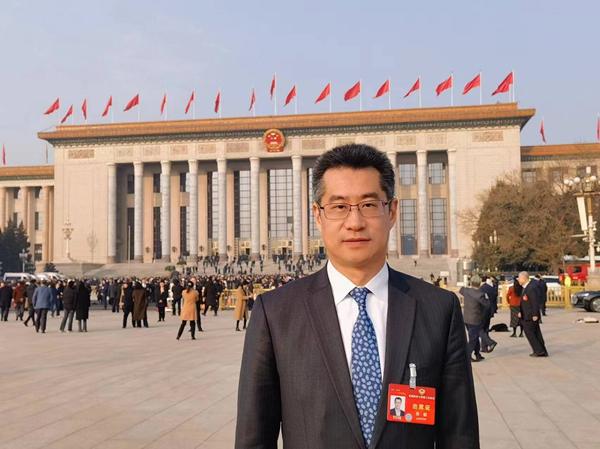
 0 Comment(s)
0 Comment(s) Print
Print E-mail China.org.cn, March 9, 2024
E-mail China.org.cn, March 9, 2024A national political advisor has called for the swift enactment of an artificial intelligence (AI) law to establish a governance system for AI algorithms and to address gaps in the current regulatory framework.

Zhang Yi, a member of the 14th National Committee of the Chinese People's Political Consultative Conference (CPPCC), poses for a photo outside the Great Hall of the People in Beijing, March 7, 2024. [Photo/China.org.cn]
Zhang Yi, a member of the 14th National Committee of the Chinese People's Political Consultative Conference (CPPCC), informed China.org.cn that he had spent nearly a year conducting research and surveys focusing on AI algorithms. Engaging with law and ethics experts, platform technicians, regulatory and supervisory institutions, and end users, he explored the current regulations and regulatory framework in this field, culminating in a report exceeding 100,000 words.
Besides proposing the AI law enactment, he also suggested passing specific regulations governing corresponding aspects. "For each entity in the industrial chain, I suggest adopting the principle of balancing rights and obligations, and imposing corresponding compliance obligations based on the entity's control over the AI systems. AI algorithm technologies should be classified according to risk levels and subjected to different regulatory measures. Furthermore, there should be established obligations that regulate the entire lifecycle, including the pre-event, interim and post-event phases," he said.
In November 2022, OpenAI released ChatGPT, initially based on the GPT-3.5 architecture. Since then, OpenAI has released GPT-4. In February 2024, it unveiled the large video model Sora, which further fueled global AI enthusiasm. Although algorithm technology has been widely applied, it has also raised a series of legal and ethical concerns, including algorithmic discrimination, algorithmic black boxes, information silos, and algorithmic dominance.
In China, the current algorithm management regulations are seen as insufficient due to their nature as departmental rules with limited legal effect and their narrow focus on civil and commercial sectors. Meanwhile, fragmented regulatory bodies lead to either competition or even oversight, particularly for newly emerged algorithms. The complexity of algorithm mechanisms, combined with the informational and technological advantage held by providers, makes it challenging to identify and rectify algorithmic infringements accordingly. Moreover, the rapid evolution and vast applications of generative AI technology are challenging the existing regulators.
According to Zhang, efforts should be made to enhance the existing joint regulatory mechanism governing algorithms, which involves multiple government departments. The technological gaps when enforcing the relevant regulations, as he proposes, could be addressed by leveraging market forces such as introducing external experts in algorithms and AI during the enforcement process. Additionally, exploring the use of AI technology might be considered to enhance regulatory efficiency in regulating AI activities.
He also proposed mechanisms to enhance the protection of user rights and, at the same time, ensure accountability of service providers when algorithmic infringements occur.
In addition, Zhang presented other proposals, including a suggestion on the legislation of a private sector promotion law, at the second session of the 14th CPPCC National Committee, which is set to conclude on March 10 in Beijing.
Go to Forum >>0 Comment(s)